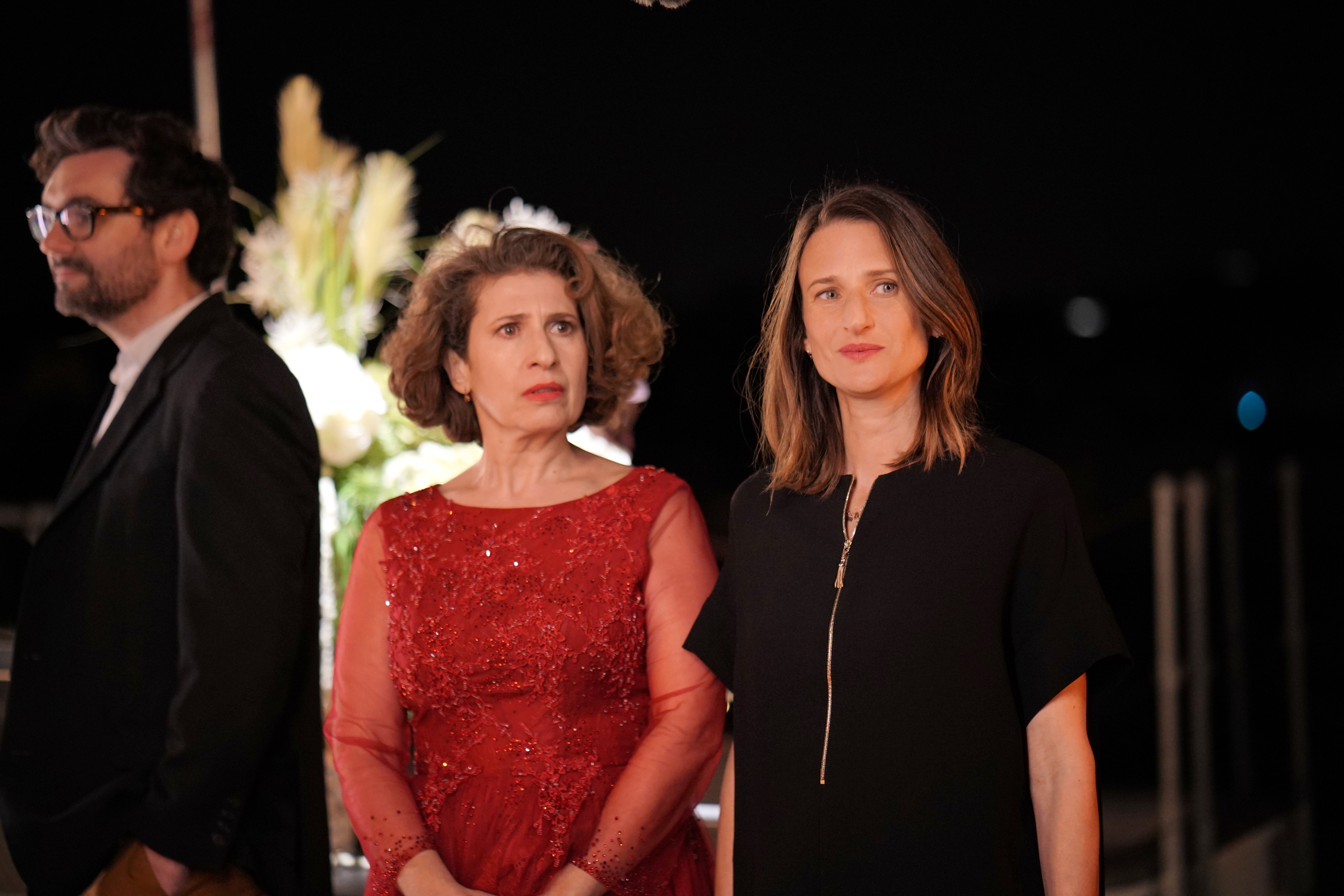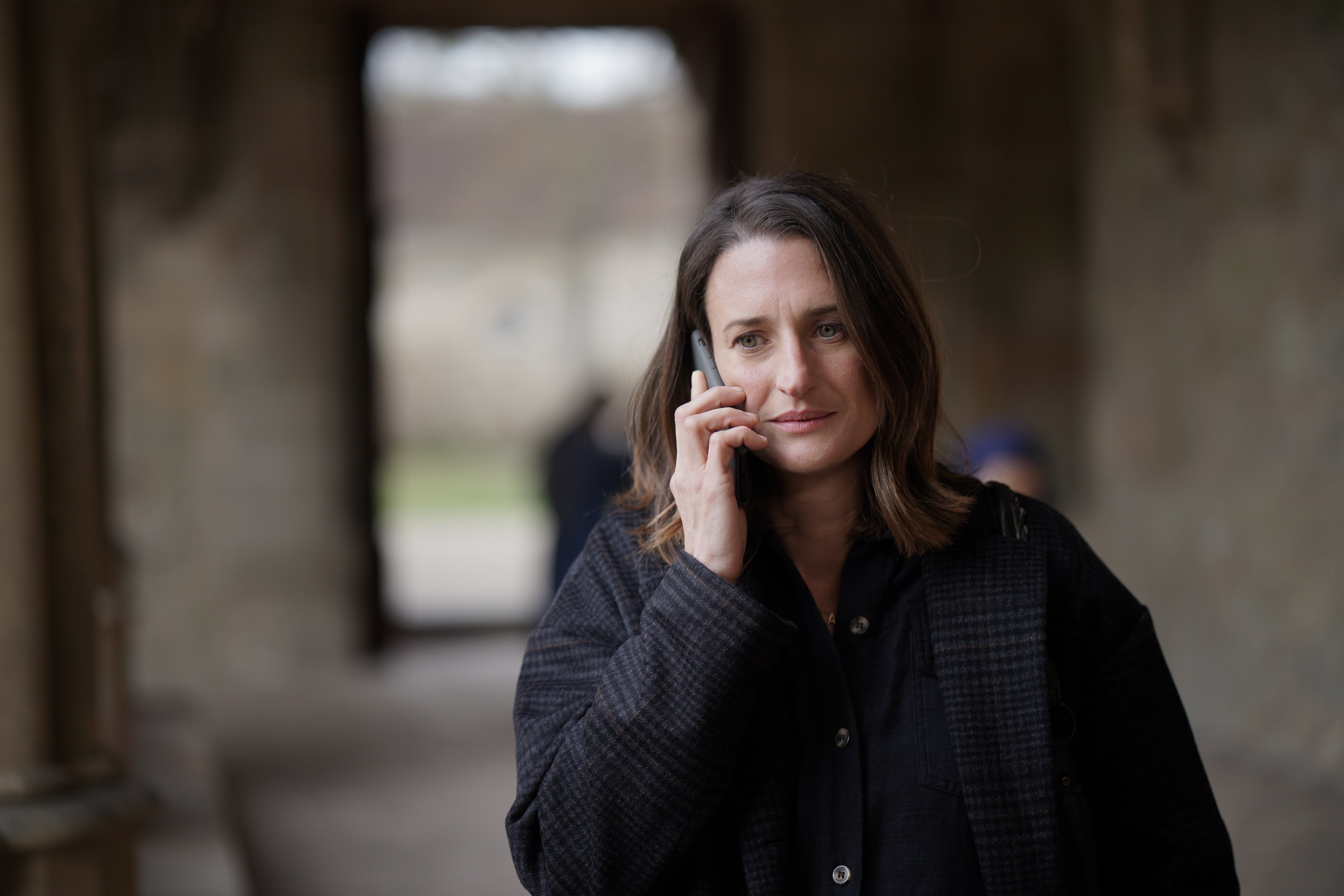How Netflix hit Call My Agent! turned into the British remake Ten Percent
‘W1A’ creator John Morton and a cast that includes Jack Davenport, Lydia Leonard and Prasanna Puwanarajah talk to Olivia Petter about the differences between France and Britain and the ‘comedy in the white lies that are told to lubricate the cogs of this industry’


Your support helps us to tell the story
This election is still a dead heat, according to most polls. In a fight with such wafer-thin margins, we need reporters on the ground talking to the people Trump and Harris are courting. Your support allows us to keep sending journalists to the story.
The Independent is trusted by 27 million Americans from across the entire political spectrum every month. Unlike many other quality news outlets, we choose not to lock you out of our reporting and analysis with paywalls. But quality journalism must still be paid for.
Help us keep bring these critical stories to light. Your support makes all the difference.
John Morton is a francophile. “Everything in Paris is so effortlessly beautiful,” he says, eyes wide. “The French even argue in a stylish way. London is not like that.”
We’re discussing the W1A creator’s latest TV series, Ten Percent, a London-based adaptation of Call My Agent!, the French comedy-drama about a group of talent agents in Paris. The series, which launched in 2015, became a word-of-mouth hit on Netflix during the pandemic (Ten Percent has been made by streaming rival Amazon). The original was set to end after its fourth season in 2021, but given its newfound popularity, both a fifth season and a film were commissioned.
Morton was a fan early on. “I loved it,” he says, recalling bingeing the entire series. “There was no point trying to replicate the French show; we don’t move like that in our cultural and professional lives in the UK. The energy is different. Transplanting it all onto new soil, that was the challenge.” One of the key differences, he adds, is communication. “The very thing that makes the French show so appealing is that the characters will tell each other how they feel. But us Brits are very poor at saying what we mean; part of growing up in Britain is understanding that. And so that passion and emotion is in our show, but it’s buried deeper. It’s a different rhythm.”
That said, some characters and storylines in Ten Percent are directly modelled on Call My Agent’s originals. Some of them look startlingly alike, too – Rebecca Humphries, who plays the doe-eyed assistant of agency boss Jonathan Nightingale (Jack Davenport), is a dead ringer for her French counterpart, Laure Calamy. It would be easy to view Morton’s show as mere replication, particularly because its first episode is almost identical to that of Call My Agent, with Kelly Macdonald taking over from Cécile de France as the actor who, overnight, has become “too old” to play certain roles. However, Morton explains, this was a case of imitation being the highest form of flattery.
“It was one of my favourite episodes,” he says of the French version. “It feels so true and yet so ridiculous that she’s told to have plastic surgery to get parts. Why wouldn’t one tell that story?” There was an accidental benefit, too. “Having a big slug of what loyal fans remember from the French show in the first episode takes them with us instead of alienating them. So, practically, it felt like not a bad thing to do.”
From there, though, Ten Percent diverges quite sharply from the original. Different dynamics. New nightmares. And many, many more actors having meltdowns. Novelty also comes by way of celebrity appearances, with Helena Bonham Carter, Dominic West, and David Oyelowo all on the line-up of actors playing themselves.
Then there’s the added twist of the father-son relationship between Jonathan and the avuncular Richard Nightingale (Jim Broadbent), who, as in the French version, dies at the start of the show, swiftly sending the agency into financial turmoil. Hence the American company that rushes in to save the day, one nauseatingly earnest platitude at a time.

And then there is the cast. Davenport, Maggie Steed, Lydia Leonard and Prasanna Puwanarajah comprise the central quartet of agents. “I absolutely loved Camille Cottin,” says Leonard, who plays Rebecca Fox, the acerbic, high-powered agent who is very similar to Cottin’s Andréa in the French show. “Out of nerves I had to stop watching [Call My Agent!] because Camille is so brilliant,” she adds. “You’ve got to make it your own.”
The scripts – shrewd, laden with farce, and unmistakably British – made that fairly straightforward. “They just had this signature John Morton authorship,” says Puwanarajah, who plays Dan Bala. “Reading them, I wasn’t thinking of the French show; it wasn’t really on set with us.”

Watch Apple TV+ free for 7 days
New subscribers only. £8.99/mo. after free trial. Plan auto-renews until cancelled

Watch Apple TV+ free for 7 days
New subscribers only. £8.99/mo. after free trial. Plan auto-renews until cancelled
Having said that, Puwanarajah did get the French cast’s blessing to remake the show. Sort of. “A friend of mine encountered one of the actors in the original show and told him he knew one of the guys in the remake. The actor embraced him and said, ‘I give all my love to him.’ How nice is that? Would Brits be like that? Or would we just panic and say, ‘Oh, well, I hope they’re not very good.’”
But back to the celebrity guests, who, Morton says, have one of the hardest jobs on set. “They’re not really doing parodies of themselves,” he explains. “What we’re asking them to do is something slightly different and more selfless, because their job is to bring believability. Their job is to bring all that authenticity into the show, rather than do a comic turn.”
Thanks to the unpredictable nature of the ’biz, none of the featured guests were chosen specifically for their roles. “The only way of proceeding was to bash a name into the script as a placeholder, and say: ‘This story has to work for a number of actors roughly at that stage in their career,’” explains Morton. “Because if you become loyal to one particular character and they can’t do it, you’re stumped. You have to trust your luck a bit; we got lucky eight times.”

All of the actors who guest-star are established British talents. It’s not beyond the realms of possibility that among them could be Davenport himself, whose credits include Pirates of the Caribbean, The Talented Mr Ripley and Coupling. “I remember talking to our casting director and asking, ‘Is Jack too famous?’” Morton says. (“The answer is ‘No,’” adds Davenport.) “But we thought, f*** it, he’s right for the part,” the writer says.
Nonetheless, the process of actors playing parts alongside other actors playing themselves is an odd one, particularly for Davenport, who says he knows 80 per cent of those making guest appearances. “I’ve been doing this for a long time, so in terms of situations that actors have to face, I’ve done most of them. But I’ve never been in a scene with a friend, who is sort of playing themselves but I’m playing some other guy. It was like having vertigo.”
Playing an agent, it transpires, was an enlightening experience for all, despite the obvious fact that each of the actors involved has their own agent, and would presumably have understood the role more than most. “I have an even higher degree of admiration for agents now,” says Leonard, who has been with hers since drama school. “There’s quite a lot of comedy in the white lies that are told to lubricate the cogs of this industry behind the scenes. It does have to happen quite a lot.”
Davenport, who confesses he’s usually “not much of a researcher”, took his agent out for lunch to quiz him on the job when he got the part. “He said one of the hardest aspects is that all day long you’re making someone’s career, and then seconds later crushing someone else’s dreams. It’s very hard to hold those two things at once in a day.”
The most arduous part, though, seems to be managing multiple egos at once. “All clients think their agent is only thinking about them,” says Davenport. “They have to make it seem like that’s the case. It’s a quality of attention that doesn’t really exist in nature. So I found that really interesting.” He pauses. “Even this poorly researched actor was able to, for once, steal some good stuff.”

To anyone outside the industry, the various shambles that happen in the show – actors being played off against one another for the same roles, playing love interests while harbouring secret crushes on each other, agents sleeping with potential clients – might seem far-fetched. But this, while heightened, is the nature of acting.
“It’s the confluence of time and financial pressures versus people whose job it is to be vulnerable in public,” explains Davenport. There are huge stakes involved, and so when that goes wrong, it can make for unusual and funny scenarios. None of the dilemmas in the show felt like a reach.”
I ask Puwanarajah if he might have any anecdotes ripe for fictionalising. “Yes!” he replies, so quickly that it prompts a laugh from Leonard, who is sitting beside him in an adjacent suite to Morton and Davenport. “A strong yes,” he continues. “I think the show is at its best when a personal thing refracts into a major cultural or societal question around representation or age. I’ve had moments where an agent I was trying to get to sign me said: ‘The scene you’re in was very dark, and obviously you’re very dark, so I couldn’t really see you.’”
Much has been said about the success of Call My Agent!. If Ten Percent matches up, it won’t be for the obvious reason that it offers viewers a behind-the-scenes look at the film industry, with all of its glittering celebrity intrigue. That, Morton says, is just what sells the show. What makes people want to watch it is something altogether different.
“I think the thing that makes you want to watch the next episode is that there’s something recognisable in each of these characters, and you don’t have to be a talent agent to see that.” Indeed, there’s grief. There’s romance. There’s even an inappropriate office crush. Human experiences that aren’t limited to agents, A-listers, or anyone else.
“The first principle of writing is that people are just people in the end,” adds Morton. “They’re agents, yes, but they’re first and foremost fallible people. On the whole, despite the fact they’re living in a pretty adversarial world, they’re mostly trying to do the right thing. And you want them to get it right eventually.”
‘Ten Percent’ comes to Prime Video on Thursday 28 April






Join our commenting forum
Join thought-provoking conversations, follow other Independent readers and see their replies
Comments